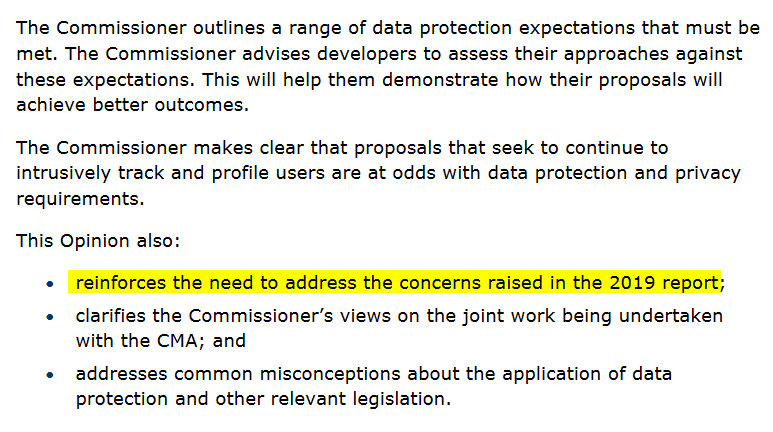
Google/FB vs. 1000s of small firms in surveillance advertising is like 2 giant retailers selling toxic food and abusing their monopoly power vs. 1000s of small firms selling toxic food.
Helping the small firms to better sell toxic food so the giants lose power is not a solution.
Helping the small firms to better sell toxic food so the giants lose power is not a solution.
Yep going after the small firms' toxic food sales may further increase the power of the giants selling toxic food.
But that doesn't mean going after the small firms is bad. It just means that, at the same time, going after the giants' toxic food sales and power is required, too.
But that doesn't mean going after the small firms is bad. It just means that, at the same time, going after the giants' toxic food sales and power is required, too.
Of course, small toxic food is a part of big toxic foods' supply chain.
Now imagine a new law would make it more difficult to handle toxic food for everyone. What should big toxic food do?
Now imagine a new law would make it more difficult to handle toxic food for everyone. What should big toxic food do?
✅ Claim (and make small toxic food associations claim) the law will only benefit big toxic food, because only big toxic food can afford (pseudo) compliance.
This is what G/FB always did when it came to data protection and privacy legislation, in the EU, in the US and elsewhere.
This is what G/FB always did when it came to data protection and privacy legislation, in the EU, in the US and elsewhere.
Increasingly under pressure, big toxic food announces it will block parts of its third-party toxic food supply it has built its business on for years.
To some extent big toxic food could increase its own production, it would still dominate, and it's just an announcement anyway.
To some extent big toxic food could increase its own production, it would still dominate, and it's just an announcement anyway.
🚨 Small toxic food: "Big toxic food blocking us jeopardises the economy and will kill millions of jobs"
🚨 (Some) competition authorities: "Big toxic food blocking small toxic food will kill competition. Let small toxic food flourish!"
🙂Big toxic food: "We're fine either way"
🚨 (Some) competition authorities: "Big toxic food blocking small toxic food will kill competition. Let small toxic food flourish!"
🙂Big toxic food: "We're fine either way"
I admit the analogy goes only so far ;) ...but I think it still provides some insight.
To stay with the analogy, small toxic food wouldn't exist in the first place if big toxic food had not created the toxic food supply chain for its own benefit.
And small toxic food consists of a variety of different actors, including:
And small toxic food consists of a variety of different actors, including:
- smaller middle men that take the largest cut, just as predatory as big toxic food
- many shady actors that mislead everyone else
- large corps in related industries that have their own stake in small toxic food
- myriads of small actors that have no choice but to participate
- many shady actors that mislead everyone else
- large corps in related industries that have their own stake in small toxic food
- myriads of small actors that have no choice but to participate

"But but but ...the basic premise is wrong, the food isn't toxic at all!"
And we have filters like privacy policies and settings and choices and promises and stuff that totally protect you and put you in control. 🤖
And we have filters like privacy policies and settings and choices and promises and stuff that totally protect you and put you in control. 🤖

"Ok, perhaps the food is a bit toxic, but"
Constantly monitoring+profiling everyone and sharing intimate data about the everyday lives of billions across myriads of companies nobody ever heard of is just necessary to preserve the free internet, the free press and democracy! 🤡
Constantly monitoring+profiling everyone and sharing intimate data about the everyday lives of billions across myriads of companies nobody ever heard of is just necessary to preserve the free internet, the free press and democracy! 🤡
In a nutshell:
- No toxic food
- Stop personal data sharing across adtech, publishers, marketers, big tech & others
- Break up, regulate and tax big tech
- Ban utility-scale services from exploiting data for purposes other than providing the service. If they cannot, let them die
- No toxic food
- Stop personal data sharing across adtech, publishers, marketers, big tech & others
- Break up, regulate and tax big tech
- Ban utility-scale services from exploiting data for purposes other than providing the service. If they cannot, let them die
+ Find ways to fund public-interest media without relying on surveillance advertising, including public funding
(I guess the analogy's main flaws are:
- many actors in the personal data industry operate in two or multi-sided markets
- scale/network effects in tech
- data exploitation has 2nd/3rd order effects beyond individual health
Not a flaw: a toxic food industry may indeed exist 😬)
- many actors in the personal data industry operate in two or multi-sided markets
- scale/network effects in tech
- data exploitation has 2nd/3rd order effects beyond individual health
Not a flaw: a toxic food industry may indeed exist 😬)
• • •
Missing some Tweet in this thread? You can try to
force a refresh













